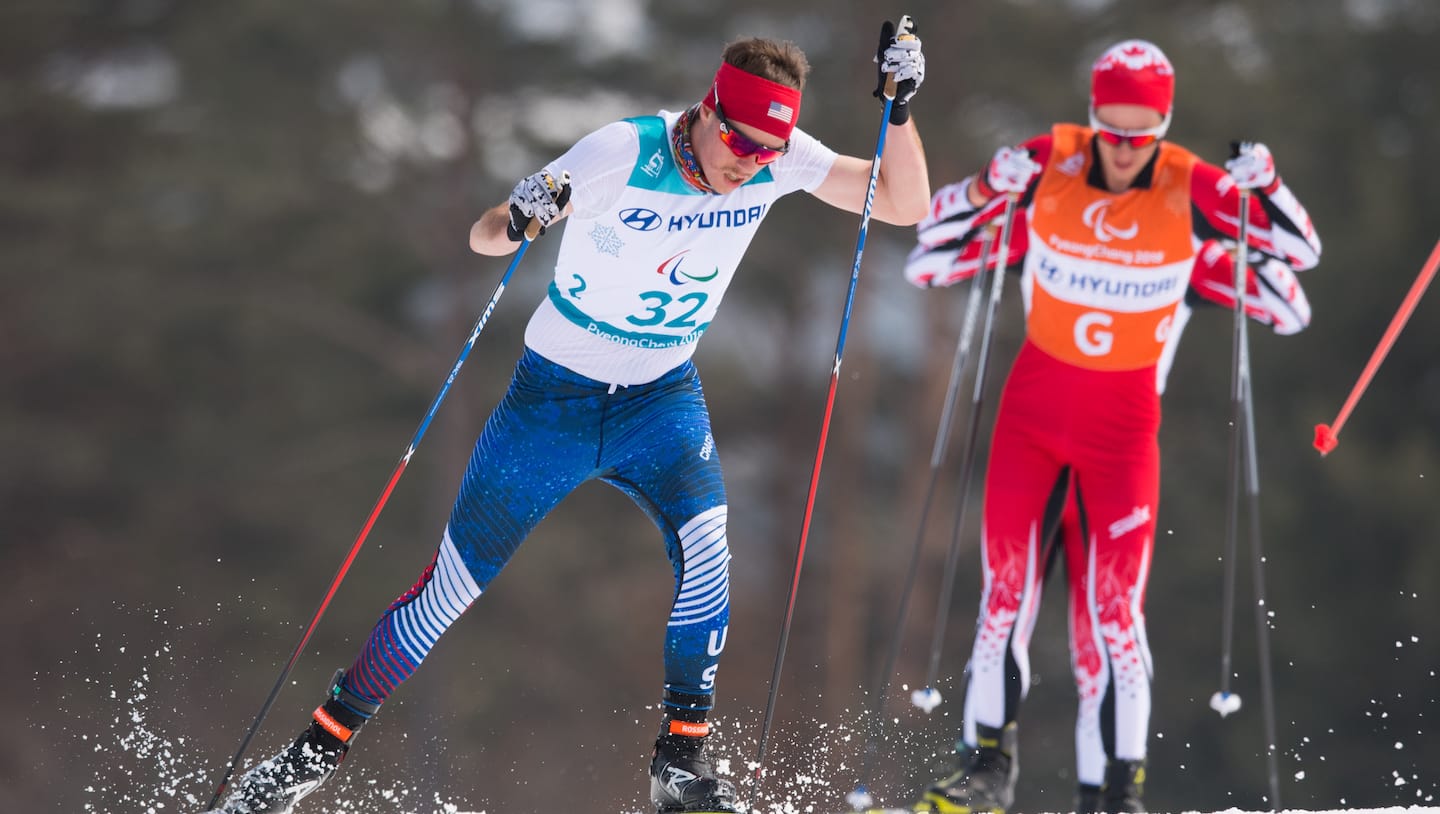
Jake Adicoff And Max Nelson, The U.S. Team’s Visually Impaired Skiers, Chart A Unique Course
by Alex Abrams

Jake Adicoff competes at the Paralympic Games PyeongChang 2018. (Photo: Joe Kusumoto)
Jake Adicoff has no vision in his right eye and only peripheral vision in his left eye after his mother contracted chicken pox while pregnant with him. That hasn’t stopped him from becoming one of the country’s top Para Nordic skiers.
“I have good enough vision to ski by myself,” Adicoff said at the Team USA Media Summit on Oct. 19. “So I’m lucky to be able to train by myself if I need to, but this season I’m skiing with the guide (Sam Wood) who happens to be one of my very best friends.”
National Blind Sports Week began Oct. 25 as a way of celebrating the abilities, opportunities and awareness of sports for visually impaired athletes. The week ends Saturday with the recognition of National Blind Sports Day.
For Adicoff and Max Nelson, skiing with limited vision is just a way of life. They’re the only members of the U.S. Paralympics Nordic Skiing national and development teams who compete in the visually impaired class.
Nelson, a promising 17-year-old skier from Mahtomedi, Minnesota, is blind in his left eye. He can see only about 25-30 percent out of his right eye.
Nelson and Adicoff, 26, have been training over the past year with the hopes of qualifying for the Paralympic Winter Games Beijing 2022, which begin in March.
The skiers are at different points in their Paralympic careers. Nelson is a rising star who’s still in high school, while Adicoff is a silver medalist who’s attempting to make a comeback following a three-year hiatus from the sport.
Adicoff told TeamUSA.org over the summer that he hopes to medal in three individual events and win at least one gold in Beijing.
“I didn’t want to go to Beijing for the ride. I’ve done the experience before, and it was phenomenal and very fun,” Adicoff said then. “… I’m coming into this with very clear performance goals that are very, very lofty.”
On March 19, Nelson made history as a high school junior when he won the Metro East Conference individual championship. He became the first visually impaired Nordic skier to win an individual conference title in Minnesota.
Nelson, however, cut his high school season short to compete with U.S. Paralympics Nordic Skiing. A week after winning the MEC championship race, he traveled to Slovenia and competed in his first world cup event.
“The journey’s been a long one. I would say this last year, winning (the) Metro East Conference (for) my high school team and getting to know the Paralympic coaches has been really awesome,” Nelson said at the Media Summit.
“And my first world cup in Slovenia was amazing, and that was my first-ever big race to see what the competition was going to be like for Beijing.”
There has been one drawback to Nelson’s quick rise in Para Nordic skiing. He has had trouble finding a guide to consistently race with him.
In the visually impaired class, skiers rely on guides to ski a few feet in front of them and give them verbal cues on what they’re approaching on the course. Nelson has had at least nine different guides over the years.
“But my guides have been all over the place, usually for high school races and junior qualifier races,” Nelson said, “just because it’s hard to find a specific guide to guide me and who’s willing to put in the work and who’s willing to do it.”
Adicoff, meanwhile, made his Winter Paralympics debut in Sochi at age 18. He said he thought he was done with racing after he left the 2018 PyeongChang Games with a silver medal in 10-kilometer classic.
The coronavirus pandemic changed his plans, though.
After Adicoff moved back to his hometown of Sun Valley, Idaho, he started skiing casually with friends. He began thinking about making a comeback and qualifying for another Winter Paralympics.
“So that was like my very slow kind of reintroduction into the sport. I got to train, got to relearn what I loved about the sport and then kind of got pulled in that way,” Adicoff said. “So yeah, for me the last 18 months have really been my path back, and yeah, I’m loving it.”
Adicoff said he tried both Nordic and alpine skiing as a kid after his parents put him in a junior skiing program in Sun Valley. With his limited vision, though, he found racing downhill was more difficult for him.
“But cross-country skiing is a little bit more (natural) for me. It’s just with my vision, skiing gates was never really going to work for me,” Adicoff said. “And to be honest, a lot of my closest friends were doing cross country and that’s kind of why I picked up the sport at a young age.”
Alex Abrams has written about Olympic sports for more than 15 years, including as a reporter for major newspapers in Florida, Arkansas and Oklahoma. He is a freelance contributor to TeamUSA.org on behalf of Red Line Editorial, Inc.